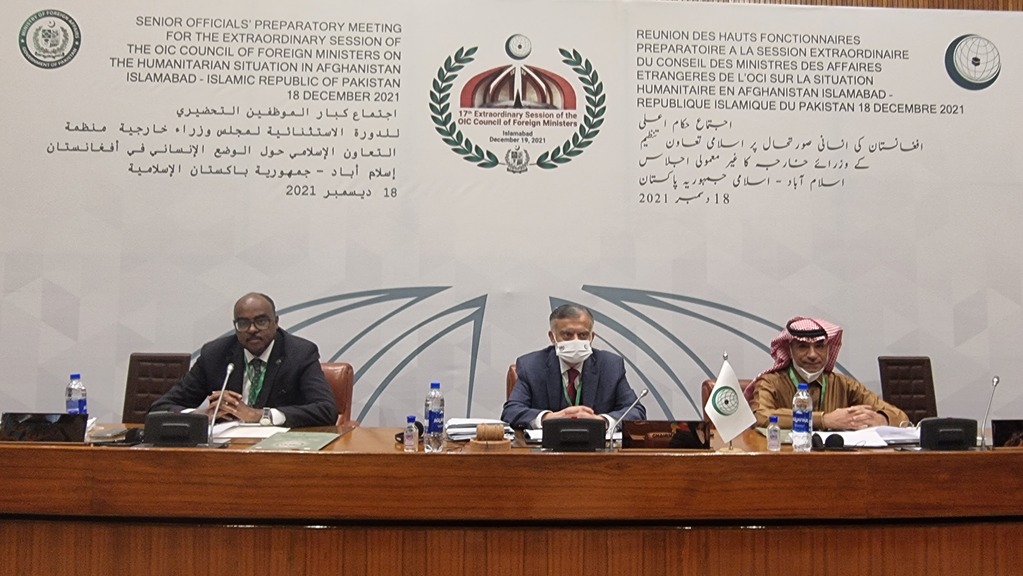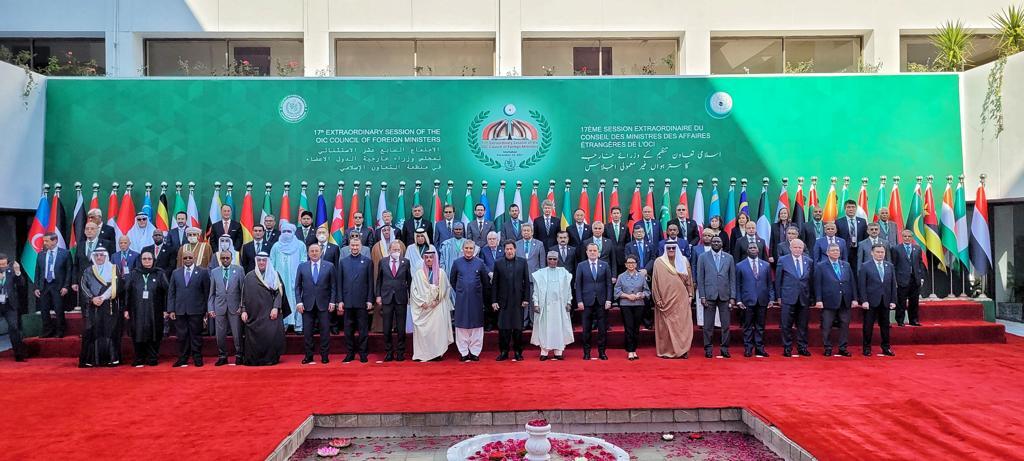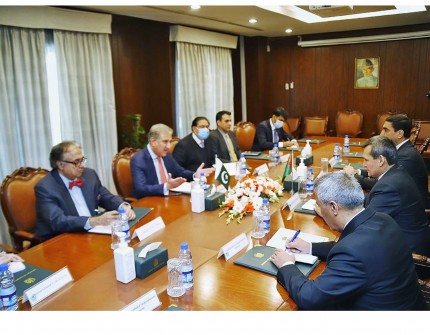nCa Report by Elvira Kadyrova, Commentary by Tariq Saeedi
On 19 December 2021, Islamabad hosted the 17th Extraordinary Session of the Council of Foreign Ministers of the Organization of Islamic Cooperation (OIC).
The Session was initiated by the Kingdom of Saudi Arabia, as OIC Summit Chair.
Besides the Foreign Ministers from the OIC Member States and Observers, the event was attended by representatives of the United Nations, international financial institutions and some non-member states including the United States, United Kingdom, France, China, Russia, Germany, Italy and Japan, as well as the EU.
The meeting was held in the backdrop of the aggravating humanitarian situation in Afghanistan and provided an opportunity to consider practical and concrete steps to help address the humanitarian needs of the Afghan people.
The Extraordinary session was preceded by the Senior Officials Meeting on 18 December 2021.
OIC: Afghanistan Needs the Full Support and Solidarity of Member States
18 December 2021
The Organization of Islamic Cooperation (OIC) has urged its member and non-member states to mobilize the necessary financial resources in order to organize and implement an immediate humanitarian assistance plan to support the people of Afghanistan.
In a statement to the opening session of the senior official meeting preparatory to the OIC extraordinary meeting of the OIC Council of Foreign Ministers on the humanitarian situation in Afghanistan, held on 18 December 2021 in Islamabad, the Assistant Secretary General of Humanitarian Affairs, Amb. Tarig Ali Bakhit Salah stressed that after decades of war, suffering and insecurity, the people of Afghanistan need relief and peace.
“It is crucial for the international community to take swift action to ensure that the people of Afghanistan have unimpeded access to life-saving assistance, and that humanitarian support is scaled up,” said Amb. Tarig.
“The OIC humanitarian Office in Kabul will assume its responsibility in coordination with the various international agencies in delivering the required assistance to the millions of people in need,” he added.
Amb. Tarig expressed his confidence that the OIC fraternity, the United Nations, regional partners as well as key stakeholders would take all necessary steps to bring sustainable solutions to the catastrophic humanitarian situation in Afghanistan in which millions of lives are at stake.
He expressed his sincere gratitude to the Kingdom of Saudi Arabia as the Chair of the Islamic Summit for taking the important initiative calling for an extraordinary session of the Council of Foreign Ministers. At the same time, he expressed his deep appreciation to the Government of the Islamic Republic of Pakistan for its generosity in hosting the Conference. ///OIC, 18 December
At the Opening of the Emergency Ministerial Meeting: The Secretary General Calls for Providing Humanitarian Assistance through the Mission of the Organization of Islamic Cooperation in Kabul
19 December 2021
The 17th Session of the Emergency Meeting of the Council of Foreign Ministers of the Organization of Islamic Cooperation kicked off today, 19 December 2021, in Islamabad, the capital of the Islamic Republic of Pakistan, to discuss the grave humanitarian situation in the Islamic Republic of Afghanistan.
Speaking at the opening were H. E. Mr. Imran Khan, the Prime Minister of the Islamic Republic of Pakistan, H.E. Mr. Shah Mahmood Qureshi, the Pakistani Foreign Minister, His Royal Highness Prince Faisal bin Farhan bin Abdullah, the Foreign Minister of the Kingdom of Saudi Arabia – the Chair of the 14th Session of the Islamic Summit, H.E. Mr. Hissein Ibrahim Taha, the OIC Secretary General, and H.E. Dr. Muhammad Sulaiman Al Jasser, the Chairman of the Islamic Development Bank Group.
The Secretary General extended his sincere thanks to the Kingdom of Saudi Arabia, Chair of the 14th Session of the Islamic Summit, for its initiative to call for holding this important meeting, as part of its firm commitment to support solidarity and joint Islamic action. He also extended his sincere thanks to the government and people of the Islamic Republic of Pakistan for hosting the meeting, and for the generous hospitality extended to the participants, reiterating its full commitment to supporting the causes of the Islamic Ummah and its keenness on promoting peace and security in the region.
In his speech, the Secretary General called upon all the Afghan parties to work to advance the interest of the Afghan people, protect lives, renounce violence, and establish lasting peace, in order to fulfill the aspirations and hopes of the Afghan people for stability, decent living, and prosperity. He stressed in this regard the OIC’s support to the peace process in Afghanistan, and expressed the Organization’s willingness to cooperate with the international and regional efforts aimed at achieving peace for the Afghan people, to harness its capabilities to achieve pace, security and stability in Afghanistan, and to make the necessary contacts in this regard.
Mr. Taha emphasized that the role of the OIC’s role in providing humanitarian aid has become more necessary than ever before, given the scale of the increasing humanitarian challenges facing the Afghan people. In this regard, he called for strengthening the role of the OIC Mission in Kabul and to provide it with the financial, human, and logistical resources so that it could assume its full responsibilities in coordinating humanitarian and development support operations for the Afghan people. He also urged member states and institutions of the Organization to provide humanitarian assistance through the organization’s mission.
On the political front, the Secretary General stated that the Organization reiterates the importance of concerted efforts to combat terrorism and acts of violence in Afghanistan, and to ensure that the Afghan territories are not used as a platform or haven for terrorist organizations. ///OIC, 19 December
Foreign Minister Turkmenistan met with Foreign Minister of Pakistan
Foreign Minister Shah Mahmood Qureshi held a bilateral meeting with Foreign Minister of Turkmenistan Rashid Meredov on the sidelines of the Extraordinary Session of OIC Council of Foreign Ministers in Islamabad, today.
The two sides took stock of existing bilateral relations and expressed satisfaction on growing cooperation in all areas of mutual interest, including coordination at regional and international fora.
Foreign Minister Qureshi underscored the need for enhancing bilateral trade and investment linkages, greater connectivity and people-to-people exchanges. He reaffirmed Pakistan’s commitment for timely completion of energy projects.
Both Foreign Ministers underscored the importance of continued engagement of the international community for sustainable peace and stability in Afghanistan, which is vital for realizing the goals of greater economic integration and regional connectivity.
The two Foreign Ministers agreed to remain in contact on further bilateral developments. ///MFA Pakistan, 18 December
nCa Commentary by Tariq Saeedi
This is the curious case of American stance toward Afghanistan. By withholding their funds, blocking their access to the banking channels and taking all possible steps to ensure the collapse of the interim Afghan government, the American policymakers must be thinking along these lines:
- We fought our longest and most expensive war in Afghanistan, lost thousands of our soldiers and rendered thousands more disabled for life, and in the end we fled inelegantly from the Bagram Base. This was a wonderful experience and we must create conditions for another long and expensive war in Afghanistan and flee the Bagram Base in another twenty years. Our next generation must not miss this chance.
- We abhor China and Russia therefore we must create conditions where China and Russia can increase their presence and influence in Afghanistan, consequently denying us the space we so desperately need there.
- We must put 40 million Afghan people through life threatening economic and social conditions and that will make them love us so dearly. We will win their hearts and minds by starving them.
- We must make life difficult for our European allies by forcing them to go against the rest of the world. This will further cement the bond.
Of course this is not what the American policymakers are thinking – if they are thinking at all.
To them, acting tough will teach the Taliban a lesson.
To the rest of the world, the sane world, the USA is a pain in the …. well, neck.
The OIC foreign ministers’ summit held in Islamabad on 19 December 2021, will possibly not solve every problem facing Afghanistan but will certainly help them live through the winter without any major misfortune.
The Islamic Development Bank has agreed to coordinate the support.
Once the winter has been weathered, the conditions will ease sufficiently to allow the breathing space to the Taliban government and the people of Afghanistan.
The winter will pass but the memories will remain.
The Afghan people will remember for a long time who tried to starve them to death and who came to their rescue when they were in need.
There no use talking sense to the USA. — It is a spent force, a fallen giant, an empire hurtling into oblivion. Its ‘exceptionalism,’ euphuism for a mixture in equal parts of arrogance and imprudence, is its undoing.
What concerns us is Europe, which has always been partner and friend of Greater Central Asia since the days of the Silk Road. Located in the contiguous Eurasian landmass, Europe and Greater Central Asia are natural allies.
This is the time for Europe to think of its own interests.
By towing the line of the United States, Europe has nearly maneuvered itself between a rock and a hard place.
The rock is the consequences if the Taliban government collapses.
The hard place is if the Taliban government survives and eventually moves to some kind of normalcy while Europe keeps withholding its support.
The range of consequences in case of Taliban collapse has been envisaged and imagined at various forums. They include the strong likelihood of fresh influx of refugees at the European borders and reemergence of terrorism.
What has been generally overlooked is the scenario in case of success of the Taliban without any European and American support.
Two ideas voiced at the OIC foreign ministers’ summit in Islamabad suggest that the Taliban government might survive, even succeed:
- The Islamic Development Bank will prepare a grassroots plan for the development of agriculture, ensuring food security for the country and reasonable income for the farmers.
- The OIC-UN joint mechanism will coordinate the donations from the private sector.
Because of the nature of the terrain and the very small size of individual land plots, total food security will perhaps not be obtainable. However, by next winter (assuming that the current winter can be endured through aid) there should be adequate growth of survival rations.
More importantly, the donations from the private sector can play a decisive role.
In the Islamic system, there is 2.5% tax (Zakat) on the accumulated wealth. Almost every rich individual and family pays it every year. A study by the World Bank and the Islamic Research and Training Institute (IRTI) of the Islamic Development Bank (IDB) estimates that global Zakat funds reach $550 billion to $600 billion per year.
Just imagine, if only 10% of this Zakat could be channeled to Afghanistan, it will more than cover the annual budget of the country.
Although Zakat can be paid any time, traditionally it is paid during the month of Ramadan. In 2022, Ramadan will start on 1 April.
If the promises and pledges during the OIC meeting in Islamabad result in helping Afghanistan survive the winter, it will hopefully be a smooth sailing further on as the Zakat donations should start arriving in April next year.
If Europe stands on the side and keeps creating obstructions while Afghanistan endures the winter crisis and gets on the firmer grounds next year, what will be the possible consequences?
- There are contracts to be had in the mining and mineral rights. The potential is in trillions of dollars.
- Two railway lines that would appear in the foreseeable future in Afghanistan will generate a whole set of lucrative possibilities.
- Availability of abundant natural gas and electricity because of regional partnerships, together with cheap labour, will give rise to a wide array of industries. Many of them will certainly be joint ventures with foreign partners.
- The current attitude of Europe toward Afghanistan will shrivel the political space it can claim. As a result, Europe will limp while its competitors will sprint.
The noise about the rights of minorities and women is pure baloney. There are similar problems at enormous scale in some other parts of the world and Europe seems totally blind to them.
In this very small window of opportunity, Europe must take quick and right decisions. /// nCa, 20 December 2021


